The views expressed in our content reflect individual perspectives and do not represent the authoritative views of the Baha'i Faith.
Sometimes people look at the teachings of the Baha’i Faith and conclude it is a fantasy, a utopian scheme, that it will never work.
Entrenched in negative views about humanity; with so much disunity, hatred and war over so many thousands of years; it’s easy to understand why people might feel this way.
After all, the Baha’i teachings call for racial unity and harmony, the essential unity of all religions and a federation of the planet’s nations in a World Parliament whose members are elected by the people in their respective countries. Those goals can seem pretty utopian, and it’s easy for most of us to justify cynicism and pessimism. But just for a moment, let’s look at the Baha’i teachings through a different lens, and see if we can envision their outcome.
Baha’u’llah declared that man is noble. In the following quotation from his writings, the words “I” and “Me” refer to God:
O Son of Spirit! I created thee rich, why dost thou bring thyself down to poverty? Noble I made thee, wherewith dost thou abase thyself? Out of the essence of knowledge I gave thee being, why seekest thou enlightenment from anyone beside Me? Out of the clay of love I molded thee, how dost thou busy thyself with another? Turn thy sight unto thyself, that thou mayest find Me standing within thee, mighty, powerful and self-subsisting. – Baha’u’llah, The Hidden Words, pp. 6-7.
That we human beings have been so dis-unified and destructive over the past millennia reflects our spiritual and emotional immaturity. As we enter humanity’s long-awaited age of maturity, which the Baha’i teachings promise us, we must now change our negative attitudes toward ourselves and each other by embracing our nobility and dignity—and translate this into respectful, loving behavior.
The Baha’i Faith helps us do this because it works! It destroys the walls of hatred, skepticism, prejudice, cynicism, fear, disunity, and resentment, replacing them with love, unity, harmony, respect, kindness, and justice. How does it destroy these walls and build bridges of unity?
First of all, Baha’is study the writings of Baha’u’llah and the other central figures of the Baha’i Faith. Then we sincerely strive to practice the spiritual teachings given in these writings to the best of our abilities in our daily lives. This is not easy and requires daily vigilance over one’s behavior.
Second, because the Baha’i community consists of great diversity, Baha’is must get along with all kinds of people they wouldn’t normally know. This enables the Baha’is, both individually and as a global community, to face prejudices we aren’t even aware that we have. It provides tests and opportunities for tremendous spiritual and emotional growth. This too is not easy, and it can be painful to admit to ourselves that we have prejudices—but it’s necessary if humanity truly wants peace and love to spread.
Because elimination of prejudices of all kinds is obligatory for Baha’is, and mandatory if we are going to have world peace, we have no choice but to eliminate it, no matter how long it takes, and no matter how hard the struggle. The result? Ultimately, people from all backgrounds grow closer to one another in unity and harmony.
Third, the entire Baha’i world is on the same page. Baha’is all work together for only one purpose: the spiritual transformation and unification of the entire human race, one neighborhood at a time.
Baha’is are serious about the process of community building. In addition to our other meetings, we have four core activities open to everyone in neighborhoods, in villages, in large cities and in small towns around the world. These activities consist of prayer meetings called devotionals that often include music as well as prayers from the other major world religions; children’s classes; junior youth groups; and study circles for those interested in learning more about Baha’u’llah, his teachings and writings, and being of service to others.
Fourth, no matter where you go on our planet, when you meet Baha’is in other localities, you are warmly welcomed. This is the essence of what it means to be part of the global Baha’i community—we are all one, and we can all embrace our diversity.
Fifth, and most important, Baha’u’llah wrote a binding Covenant to protect the Baha’i Faith from division, sectarianism and schism, and to enable it to expand and consolidate throughout the world while maintaining its unity. He created democratically-elected divine institutions at the local, national, and international levels to channel the Baha’i teachings and protect them from the fragmentation that has happened to so many former Faiths.
As a result, there is only one Baha’i Faith. For the first time in human history, a major world religion has succeeded in preserving its unity from the very beginning.
Because of that Covenant and the institutions Baha’u’llah has created, the Baha’i teachings assure us that its ultimate purpose will one day be achieved: the spiritual unification of the entire human race and the promise of world peace.
With these five powerful ways to build bridges of unity, it’s no wonder that the Baha’i Faith works in practice, not just in theory. If you’re skeptical, I invite you to investigate this unique phenomenon with an open mind and open heart, and reach your own conclusions.




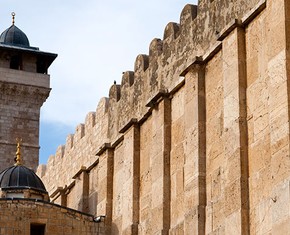

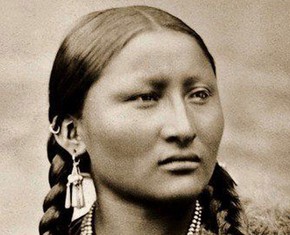

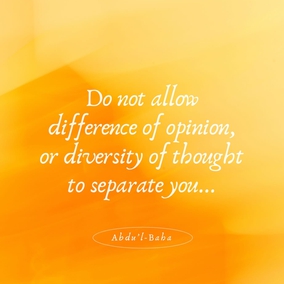
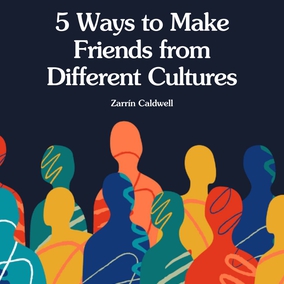
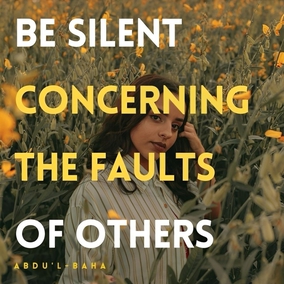





Comments
Sign in or create an account
Continue with Googleor